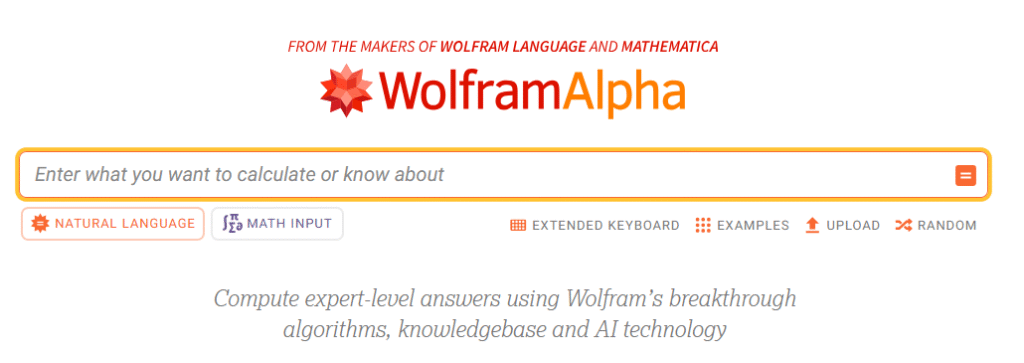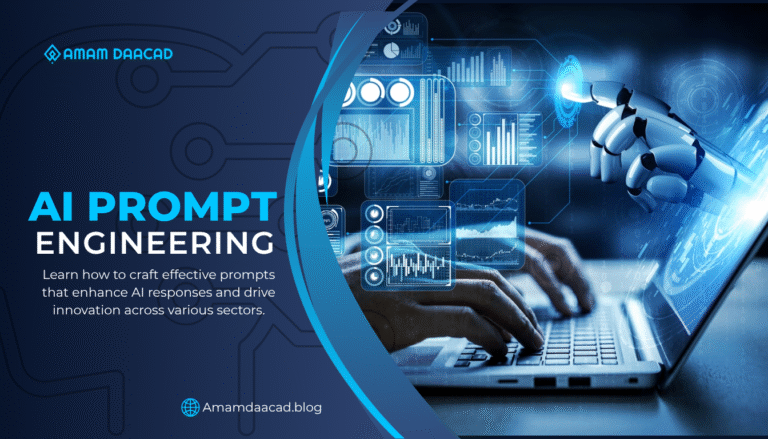Understanding Wolfram Alpha AI: What It Is and How It Works

Introduction to Wolfram Alpha AI
Wolfram Alpha is an innovative computational knowledge engine developed by Wolfram Research, designed to provide direct answers to queries through structured data and algorithms rather than mere search results. Unlike traditional search engines that retrieve information from an array of web pages, Wolfram Alpha aims to compute answers, dissecting the underlying data to deliver precise results. This unique approach positions Wolfram Alpha as a formidable resource in the field of artificial intelligence, bridging the gap between raw data and intelligible conclusions.
One of the critical features that sets Wolfram Alpha apart is its emphasis on computational knowledge. The platform employs advanced algorithms to process and analyze vast datasets, enabling it to respond to queries that involve computation or analysis. For instance, users can inquire about complex mathematical problems, where Wolfram Alpha not only provides the solution but also elucidates the steps involved in reaching that answer. This capability is particularly beneficial for students and professionals who seek clarity in their understanding of intricate concepts.
Another distinguishing aspect of Wolfram Alpha is its ability to handle a wide variety of data types and knowledge domains. From mathematics and physics to geography and history, this computational engine comprehensively caters to numerous subjects, reflecting the vast array of knowledge embedded in its database. Moreover, it continually updates and refines the information available, ensuring that users receive ongoing access to the latest data and insights. Through its sophisticated natural language processing technology, Wolfram Alpha allows users to pose questions in everyday language, enhancing accessibility for a diverse audience.
The Evolution of Wolfram Alpha
Wolfram Alpha, developed by Stephen Wolfram and launched in May 2009, represents a significant progression in the field of computational knowledge engines. The primary motivation for its development was to create a system that could answer factual queries by computing answers from structured data, in contrast to traditional search engines that primarily index information. This innovative approach has made Wolfram Alpha a unique tool for users seeking precise, data-driven responses.
In its early stages, Wolfram Alpha distinguished itself through its ability to understand complex queries across various domains, including mathematics, science, and engineering. One of the notable milestones in its development was the incorporation of a vast amount of curated data and algorithms, enabling users to generate outputs such as plots, calculations, and detailed analyses based on their inquiries. The success of the platform was heavily influenced by the Wolfram Language, which allowed for extensive computational capabilities and the seamless execution of advanced mathematical operations.
As technology advanced, so did Wolfram Alpha’s capabilities. The integration of machine learning and natural language processing has dramatically enhanced the user interface, making it increasingly intuitive. Users can now interact with the system using everyday language, expanding accessibility to a broader audience beyond mathematicians and scientists. Frequent updates and expansions to its dataset ensure that Wolfram Alpha remains relevant, covering new topics and evolving fields such as economics, health, and environmental science.
Moreover, the continued enhancement of Wolfram Alpha’s AI features has positioned it at the forefront of computational knowledge engines. By analyzing patterns and understanding context, the system has become adept at providing complex answers and insights. This ongoing evolution reflects the commitment to not only advance computational knowledge but also to adapt to the changing needs of its diverse user base.
Core Functionality and Features
Wolfram Alpha stands out as a powerful computational engine, designed to provide precise answers to a wide array of queries. At its core, Wolfram Alpha operates by interpreting user input and leveraging a vast database of curated knowledge combined with sophisticated algorithms. Users can interact with the system effectively through natural language queries, mathematical expressions, or structured data inputs.
One of the primary functionalities of Wolfram Alpha is its ability to perform complex mathematical computations. This includes algebraic expressions, calculus problems, and even more advanced topics in mathematics. By inputting a formula or a mathematical statement, users can receive step-by-step solutions, graphical representations, and even interactive visualizations. This feature is invaluable for students, educators, and professionals who benefit from instant feedback on their mathematical inquiries.
Beyond mathematics, Wolfram Alpha excels in data analysis and statistical examination. Users can input datasets or queries related to statistics, and the system utilizes its extensive knowledge base to generate detailed reports, graphs, and deeper insights. This capability is particularly useful for researchers and analysts who require accurate computations and visualizations for their data-driven projects.
In addition, Wolfram Alpha is well-equipped to handle factual inquiries across various domains such as history, geography, and science. Users can ask for specific information, such as the population of a country, the date of a historical event, or the chemical properties of a substance. The platform pulls from reputable data sources to ensure accuracy and reliability, making it an ideal tool for fact-checking and reference purposes.
Through these various functionalities, Wolfram Alpha enhances the experience of knowledge discovery. It serves as not only a computational engine but also a comprehensive resource for anyone seeking to extract valuable insights from data or answer complex queries effortlessly.
The Technology Behind Wolfram Alpha
Wolfram Alpha operates on a sophisticated infrastructure that combines algorithmic principles with advanced natural language processing (NLP) capabilities. At its core, the platform employs a unique computational engine, designed to interpret user queries and deliver precise answers based on a vast repository of curated data. The fundamental algorithms drive the platform’s ability to parse, understand, and analyze input from users, translating natural language into a format suitable for computation.
One significant aspect of this technology is the use of a curated knowledge base, which consists of structured information across various domains. This knowledge base is meticulously developed and constantly updated to ensure accuracy and relevance. By leveraging this curated data, Wolfram Alpha can generate outputs that are not only computationally derived but also contextually rich and pertinent to the user’s needs. The algorithms employed in this process encompass various mathematical, statistical, and computational techniques to provide answers that can range from simple facts to complex data interpretations.
In addition to its algorithmic framework, Wolfram Alpha’s natural language processing capabilities play a critical role in its functionality. The NLP tools enable the system to understand user intent, even when queries are posed in colloquial language. This feature enhances user experience by allowing queries to be framed in a more conversational manner, mitigating the need for precise syntax often required by traditional search engines. The seamless integration of these technologies fuels Wolfram Alpha’s ability to process inquiries effectively, making it an invaluable resource for individuals seeking quick and reliable answers.
Through the confluence of advanced algorithms, NLP, and well-structured knowledge databases, Wolfram Alpha encapsulates the essence of intelligent computation, setting a benchmark for AI-driven query systems.
Understanding Computational Knowledge
Computational knowledge is a pivotal aspect of the functionality offered by Wolfram Alpha, a computational search engine that fundamentally transforms raw data into actionable information. At its core, computational knowledge signifies the capacity of a system to interpret, manipulate, and present data in a way that is both meaningful and useful to users. This concept is crucial in leveraging the vast quantities of information available on the internet, allowing for quick and precise computations that would otherwise take significant time and expertise to perform manually.
Wolfram Alpha employs advanced algorithms and vast databases to access and process enormous amounts of information. By utilizing structured data and mathematical procedures, it converts complex datasets into understandable outputs. For instance, when a user inputs a query, the system analyzes this input and retrieves relevant information, applying computations to deliver accurate results. This capability not only enhances user experience but also democratizes access to knowledge, allowing individuals with varying levels of expertise to engage with intricate data.
This approach contrasts with traditional search engines, which predominantly provide links to sources containing information. Instead, Wolfram Alpha interprets inquiries and synthesizes data to furnish users with concrete answers, ranging from mathematical equations to statistical analyses. This intrinsic ability to bridge the gap between raw data and comprehensible information is what sets Wolfram Alpha apart in the realm of computational knowledge.
The significant role of computational knowledge in Wolfram Alpha’s design underscores the importance of contextual understanding in processing user queries. As a result, Wolfram Alpha stands as a powerful tool for students, researchers, and professionals alike, providing them the means to effortlessly access complex computations and enrich their knowledge base through a user-friendly interface.
Applications of Wolfram Alpha AI
Wolfram Alpha AI stands out as a powerful computational knowledge engine that has a multitude of practical applications across various fields including education, data science, and engineering. One of the most prominent uses of this technology is in educational settings, where students leverage the platform to solve complex mathematical problems. The ability to input specific queries and receive step-by-step solutions enhances not only their understanding of mathematical concepts but also encourages self-directed learning. For instance, high school algebra students can input equations and receive detailed explanations, allowing them to grasp the underlying principles more effectively.
In the realm of data science, professionals utilize Wolfram Alpha AI for its robust data analytics capabilities. Analysts can input extensive datasets and use the platform to visualize trends and patterns that would typically require significant manual effort. This time efficiency is paramount, as it allows data scientists to shift their focus toward more strategic decision-making instead of merely crunching numbers. An illustrative example would be data scientists working for a retail brand who can analyze customer behavior over time by simply querying the data to derive insightful trends that inform marketing strategies.
Additionally, engineers harness the capabilities of Wolfram Alpha to model complex systems and simulate various scenarios. The AI can process variables and mathematical expressions in real time, which is invaluable for simulations in fields such as civil or mechanical engineering. For example, engineers might use Wolfram Alpha to predict the load-bearing capacity of structures, thereby ensuring safety and compliance with industry standards. Overall, the integration of Wolfram Alpha AI into these professional domains not only streamlines workflows but also enhances accuracy, ultimately leading to more informed decisions and innovation.
Understanding Limitations
Wolfram Alpha AI, while a powerful computational tool, is not without its limitations. One of the primary challenges it encounters is the inability to comprehend context in the same manner that a human would. For instance, when faced with ambiguous queries, Wolfram Alpha may deliver results that do not align with the user’s intent or may misinterpret the specific nature of the question. This is particularly evident in queries that require nuanced understanding or involve common idiomatic expressions, which the system may not fully grasp.
Moreover, Wolfram Alpha’s effectiveness is heavily dependent on the quality and availability of the underlying data. Although it can perform complex computations and generate detailed information, its answers are only as reliable as the data it has been trained on. There are scenarios where up-to-date information is essential, such as trending news topics or volatile economic data. In such cases, the system may provide outdated or incomplete responses, thereby limiting its usefulness in real-time decision-making.
Another consideration is that Wolfram Alpha does not possess the human ability of creative problem-solving or insight. While it excels at providing direct answers based on existing data, it lacks the capability to think critically about complex issues or to offer advice that incorporates emotional intelligence or ethical considerations. Therefore, users seeking intricate advice or needing to navigate multifaceted social situations may find that human expertise is indispensable. Additionally, the AI may struggle with personal, subjective or opinion-based queries, as these types of questions typically require individual perspectives that are beyond the reach of any computational tool.
User Experience and Accessibility
Wolfram Alpha AI has garnered attention not only for its powerful computational abilities but also for its user-centric design that seeks to cater to a wide demographic. The platform’s interface is intuitively structured, allowing users to engage with the technology, regardless of their technical proficiency. One of the significant aspects of its user experience is the straightforward input mechanism where users can type natural language queries. This feature diminishes the learning curve, making it accessible to individuals with minimal technical knowledge. It enables users to interact with the system in a conversational manner, enhancing ease of use.
Moreover, Wolfram Alpha employs a clean and uncluttered design framework which facilitates seamless navigation. This is particularly beneficial for users who may feel overwhelmed by complex interfaces common in many computational tools. The layout is responsive and adapts well across devices, ensuring that users can access its capabilities on smartphones, tablets, and desktops. With such broad accessibility, it can cater to students, educators, researchers, and everyday users alike, making advanced computational algorithms readily available to all.
Wolfram Alpha also implements visual elements, such as graphs and charts, to enhance user comprehension of results. This incorporation of visual data representation aligns with diverse learning styles, promoting better understanding for users who may grasp concepts more readily through visual aids. In addition, the platform includes various help features and FAQs that guide users through more intricate functionalities. This initiative underscores its commitment to accessibility, ensuring that users can deepen their engagement with the tool as they become more familiar with its capabilities.
Overall, Wolfram Alpha AI successfully balances advanced technology with user-friendly features, making it an accessible resource for individuals with varying levels of technical expertise. Its design and operational philosophy aim to democratize knowledge and computation, thereby fostering a positive user experience across different demographics.
Future Directions of Wolfram Alpha AI
As we look towards the future of Wolfram Alpha AI, several intriguing possibilities emerge regarding its potential enhancements and adaptations to meet evolving user needs. With the rapid advancements in artificial intelligence technology and its applications, Wolfram Alpha is well-positioned to incorporate these innovations to further refine its capabilities. One promising direction lies in improving its natural language processing skills, allowing the AI to interpret user queries with even greater accuracy and nuance. This could lead to more dynamic and intuitive interactions, ultimately making the system more accessible to a wider range of users.
Moreover, integrating machine learning algorithms could enhance Wolfram Alpha’s ability to analyze vast datasets, enabling it to identify trends and generate insights in real-time. By harnessing the power of deep learning, the AI could offer more precise solutions while catering to specialized fields, such as finance, healthcare, and scientific research. The inclusion of predictive analytics would further empower users by providing foresight based on historical data, which would be particularly beneficial in decision-making processes.
Moreover, as user expectations evolve, the continued development of personalization features could greatly enhance the user experience. Tailoring responses based on individual preferences or past interactions would make Wolfram Alpha not just a search engine but also a valued assistant. Furthermore, the potential expansion of Wolfram Alpha’s integration with other applications and services could facilitate seamless workflows, enabling users to leverage its powerful computational capabilities alongside their existing tools.
In summary, the future of Wolfram Alpha AI appears promising, driven by technological advancements and a commitment to user-centered design. By embracing innovations in AI technology, Wolfram Alpha can remain a vital resource in the ever-changing landscape of information retrieval and problem-solving.
Visit
Read More
Free AI Tools for Students: Unlocking Academic Success with Zero Cost Technology




